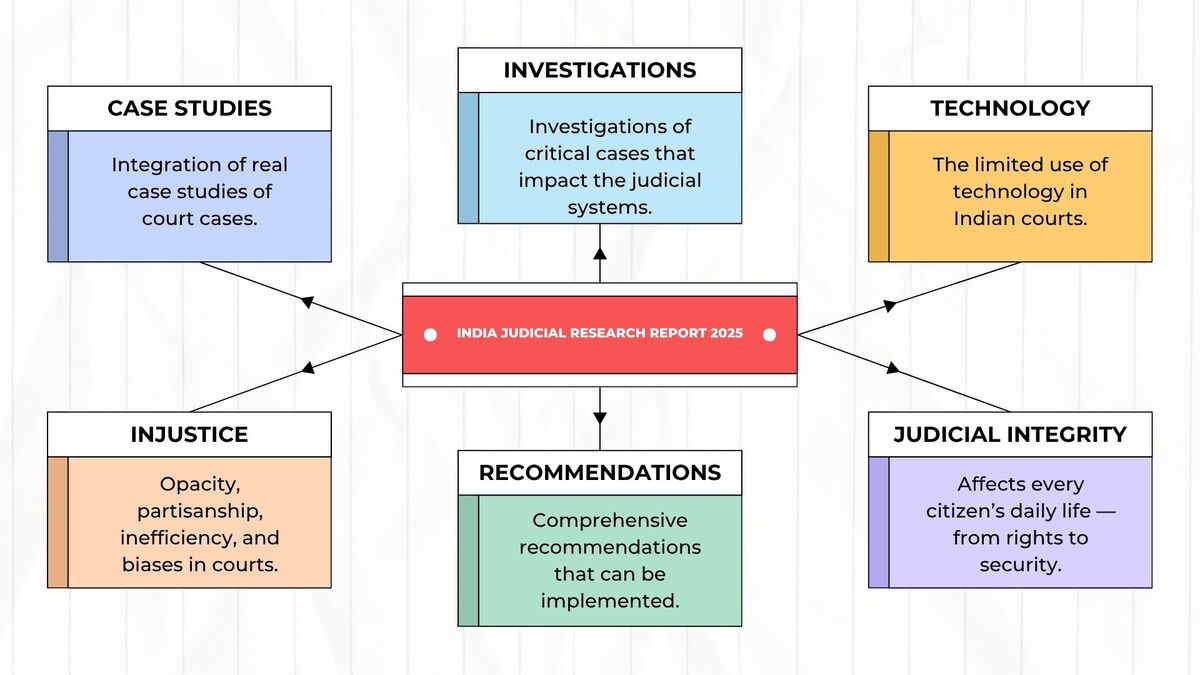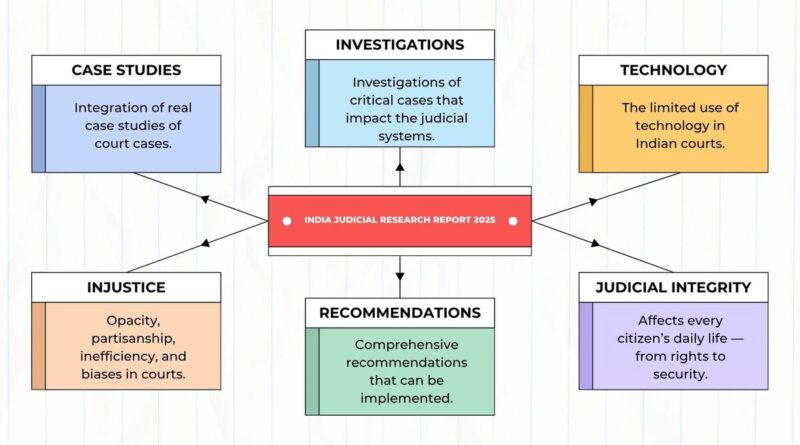Communiqué for International Stakeholders: Key Findings of the India Judicial Research Report 2025

Communiqué for International Stakeholders: Key Findings of the India Judicial Research Report 2025
The report posits that meaningful reform is impossible without addressing these foundational failures in judicial administration, competence, and transparency.
By Rakesh Raman
New Delhi | October 21, 2025
1.0 Introduction: A Systemic Crisis in Indian Jurisprudence
This communiqué disseminates the critical findings of the India Judicial Research Report 2025 (IJRR 2025), an evidence-based analysis documenting a systemic decline in the Indian judiciary that poses an existential threat to the nation’s democratic foundations. The report, authored by journalist Rakesh Raman of RMN News Service and RMN Foundation, presents a comprehensive analysis arguing that this decay constitutes a fundamental crisis of credibility and function.
To ensure global visibility, academic traceability, and permanent accessibility, the IJRR 2025 has been officially archived on Zenodo, the globally recognized research repository managed by CERN. This provides the international community with a credible and citable resource, complete with a permanent Digital Object Identifier (DOI), for research and advocacy on judicial reform, corruption, and human rights in India.
This document synthesizes the report’s core arguments regarding the quantitative and qualitative scale of the crisis, its underlying structural causes, and its profound implications for the rule of law and the protection of fundamental human rights in the world’s largest democracy.
2.0 The Quantitative & Qualitative Scale of Decline
The findings of the IJRR 2025 move beyond the long-standing issue of judicial inefficiency to present compelling evidence of a deep-seated crisis of credibility and function. The report argues that the sheer scale of systemic overload has created an environment where the judiciary is failing to perform its constitutional duties. Understanding the magnitude of this problem is a critical prerequisite for any meaningful intervention or reform effort.
The report documents the judiciary’s systemic overload and underperformance through several key data points:
Massive Case Backlog: Indian courts are overwhelmed with a staggering backlog of nearly 50 million pending cases. This institutional paralysis means that for millions of citizens, justice is effectively “denied by default” through indefinite adjournments that can span years, if not decades.
Global Performance Metrics: India’s internal challenges are reflected in its international standing. The 2024 World Justice Project Rule of Law Index ranks India 79th out of 142 countries. The report highlights particularly poor performance in crucial areas such as Civil Justice, Criminal Justice, and the Absence of Corruption.
Synthesizing this evidence, the report’s central argument is that the Indian judiciary has become a “compromised institution, plagued by inefficiency, opacity, and corruption.” In this state, it is failing to fulfill its constitutional role as an independent and impartial arbiter of justice.
This systemic dysfunction, characterized by overwhelming caseloads and a lack of accountability, creates the necessary conditions for the active politicization of justice, as detailed in the subsequent analysis.
3.0 Analysis of Judicial Bias and Executive Complicity
The report’s most alarming findings move beyond operational failures to document the judiciary’s active partiality and its role in enabling, rather than checking, state power. This section details the patterns of selective justice that the IJRR 2025 identifies as a core symptom of the institutional decay.
The evidence of judicial bias is detailed across three interconnected areas:
A Two-Tiered System of Justice: The report documents a troubling double standard in judicial outcomes. On one hand, high-profile politicians accused of serious corruption are often swiftly granted bail or acquitted. On the other, activists, students, and dissenters, such as Umar Khalid and Sharjeel Imam, are repeatedly denied bail and held for years under stringent laws like the Unlawful Activities (Prevention) Act (UAPA).
Enabling Executive Overreach: The report concludes that rather than acting as a bulwark against the misuse of state power, the judiciary frequently acts as an enabler of arbitrary executive action, thereby undermining a core tenet of constitutional democracy.
Conflicts of Interest: The practice of rewarding retired judges with lucrative government-appointed positions, or sinecures, is identified as a critical threat to judicial independence. The report argues this practice casts serious doubt on the neutrality of judgments delivered by judges who may be anticipating such post-retirement appointments.
Such consistent patterns of bias are not isolated incidents but are presented as symptoms of deeper, structural flaws within the judicial system itself.
4.0 Identified Root Causes of Institutional Decay
The IJRR 2025 moves beyond an analysis of symptoms to identify several deep-rooted systemic issues that perpetuate the crisis. The report posits that meaningful reform is impossible without addressing these foundational failures in judicial administration, competence, and transparency.
The core systemic failures identified in the report include:
Opaque Judicial Appointments: The secretive collegium system used for judicial selections is heavily criticized. The report cites this opacity as a primary cause of nepotism, casteism, and political favoritism, which compromise the merit and integrity of judicial appointments.
Deficient Professional Competence: The crisis is exacerbated by significant deficits in the professional capabilities of legal practitioners. The report references findings from the Bar Council of India suggesting that approximately 30% of lawyers may hold fraudulent degrees. Furthermore, a lack of English proficiency among many legal professionals impedes engagement with international precedents and legal texts.
Technological Dysfunction: Despite significant investment in initiatives like the e-Courts Mission Phase III, the judiciary remains heavily reliant on antiquated, paper-based processes. The report highlights the failure of systems like the Delhi High Court E-Filing Portal as an example where technology, improperly implemented, amplifies existing institutional inefficiencies rather than resolving them.
These internal systemic failures are not merely institutional flaws; they are the direct drivers of the inconsistent and biased judicial outcomes that have eroded the rights of Indian citizens and degraded the nation’s democratic fabric.
5.0 Grave Implications for Democracy and the Rule of Law
The findings presented in the IJRR 2025 are not an abstract institutional critique but a stark warning about the tangible erosion of citizen rights and democratic norms in India. The report connects the judiciary’s internal decay directly to the real-world experiences of ordinary people seeking justice.
The human and societal costs of this judicial failure are immense. When the justice system is paralyzed by delays and compromised by bias, citizens lose property, liberty, and livelihoods. This systemic breakdown critically erodes public faith in the state’s ability to uphold the rule of law, creating a climate of impunity and uncertainty.
Ultimately, the report delivers a dire warning: without comprehensive and immediate structural changes, India risks collapsing into a regime where the rule of law is “permanently subverted by political expediency and judicial complicity.” Such a scenario would represent a catastrophic failure of its democratic promise.
In response to this grave assessment, the report puts forth a clear framework for reform and calls for greater national and international awareness of the crisis.
6.0 A Call for Systemic Reform and International Attention
The India Judicial Research Report 2025 does not merely diagnose the problem; it also prescribes a path toward comprehensive transformation. It posits that superficial or incremental reforms are wholly insufficient to address the “systemic rot” and calls for bold, structural reforms, underscoring the vital role the international community can play in monitoring and encouraging this process.
The report distills its key recommendations for reform into a clear, actionable framework:
Implement complete transparency in the process of judicial appointments to eliminate nepotism and favoritism.
Establish strong and independent accountability mechanisms for both judges and lawyers to enforce professional and ethical standards.
Mandate the use of Artificial Intelligence (AI) and expert systems to audit judgments for bias and ensure consistency in judicial outcomes.
Institute systemic checks and prohibitions against the practice of rewarding retired judges with post-retirement government sinecures.
We formally present the India Judicial Research Report 2025, archived on Zenodo, as an essential, evidence-based resource for international legal bodies, human rights organizations, and academic institutions. Its findings are intended to catalyze global discourse and support concerted efforts to defend the rule of law and promote judicial integrity in India.
By Rakesh Raman, who is a national award-winning journalist and social activist. He is the founder of a humanitarian organization RMN Foundation which is working in diverse areas to help the disadvantaged and distressed people in the society.
As a technology and AI expert, his professional focus is on applying emerging AI and digital technologies to enhance decision-making, operational efficiency, transparency, and democratic participation in governance, media, and business systems. You can click here to view his full profile.
Rakesh Raman | LinkedIn | Facebook | Twitter (X)
💛 Support Independent Journalism
If you find RMN News useful, please consider supporting us.




